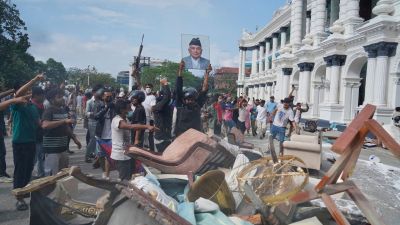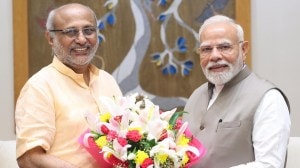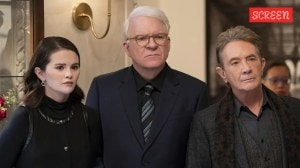House rises to welcome Mr Speaker, Sir
The ‘‘real Somnath yatra has begun,’’ declared Ram Vilas Paswan, joining a chorus of voices in praise of CPM leader Somn...

The ‘‘real Somnath yatra has begun,’’ declared Ram Vilas Paswan, joining a chorus of voices in praise of CPM leader Somnath Chatterjee who became the first Communist to become Speaker of the Lok Sabha today.
Chatterjee, who has been member of the Lok Sabha since 1971 and has received the Outstanding Parliamentarian award was unanimously elected after 18 sets of nominations papers in his favour were moved and seconded by a galaxy of leaders representing every major party in the House.
As soon as the motion was adopted, Prime Minister Manmohan Singh, leader of the House Pranab Mukherjee, and leader of Opposition L K Advani walked up to Chatterjee and ushered him from his seat to the Speaker’s Chair.
Felicitating the new Speaker, the Prime Minister struck a sentimental note and said: “Some 50 years ago, when I graduated from my college, your illustrious father presided over the Convocation where I got the degree and today, Sir, when I am going to assume a new office, you are in this illustrious Chair as our guide, friend and philosopher.’’
Pointing out that the Lok Sabha “reflects the diversity of our vast and plural nation and debates here do reflect the diversity of opinion in our democracy,” he hoped that Chatterjee would conduct the House “in the highest traditions of our great democracy.”
Sonia Gandhi, in her felicitation, also stressed the diversity and plurality of India and in a clearly political statement said: ‘‘The election that brought all of us to this House has one over-riding message and that message is that the people of our country have rejected the politics of divisiveness.’’ In many ways, she added, ‘‘the multi-faceted personality of Somnathji reflects that verdict.’’
L.K. Advani also injected a political vein by pointing out that the unanimous election of the Speaker was thanks to Atal Behari Vajpayee’s broad-minded approach. The main difference between Chatterjee’s election and that of former Speakers G.M. C. Balayogi and Manohar Joshi was that this time the opposition had agreed to the ruling coalition’s nominee. The message of today’s election was that regardless of ideological views, there were issues on which parties should transcend their differences and take a united stand, Advani said.
Former prime minister Vajpayee, offering his party’s full cooperation in the smooth running of the House, hoped that the new Speaker would not allow matters to reach a point where members “jumped into the well.” In his inimitable style, he also pointed out that Somnath “used to talk too much”, perhaps because he was elected from Bolpur. Ab Bolpur se kaam nahin chalega, ab chup rahne se kaam chalega, he said, provoking a round of laughter with his pun.
JD(U) leader Nitish Kumar took a dig at the CPI(M) when he thanked the party for allowing Chatterjee to become Speaker, since “your party usually does not give permission to accept posts.” He also hoped that Chatterjee who had been a vociferous opposition MP would now be as generous in giving the opposition permission to ‘‘do the things you did.’’
That resulted in a sharp rejoinder from former PM Chandra Shekhar who felt that Kumar was issuing a veiled threat that the opposition would make things difficult in the House.
Several leaders such as Mayawati, Laloo Prasad Yadav, H.D. Deve Gowda and Ram Vilas Paswan also stressed the need to focus on the ‘‘downtrodden sections of society’’—Dalits, Adivasis, religious minorities, OBCs and women—in parliamentary debates and hoped that Chatterjee’s left background would facilitate a pro-poor tilt in the 14th Lok Sabha.
In his lengthy reply, Chatterjee promised to conduct the business of the House “in keeping with the lofty ideals and noble goals enshrined in our great Constitution”. Outlining the “pivotal position” of the Lok Sabha in India’s political system, he concluded by saying: “We should ask ourselves, when the House rises for the day every evening, as to what we have done on that day for the country and for the people and whether we have justified the people’s faith in sending us here and nothing will give us more satisfaction than the feeling that we have tried and done our best.’’
Photos



- 01
- 02
- 03
- 04
- 05



























